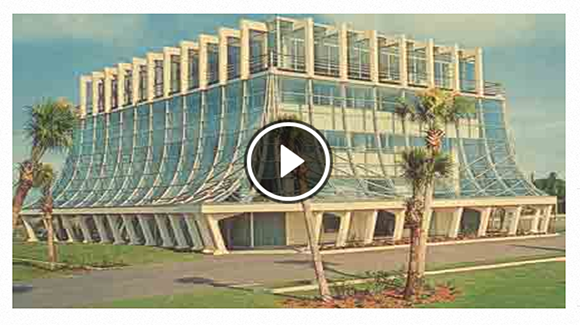If you have any images or reflections of the Glass Bank please contact us.
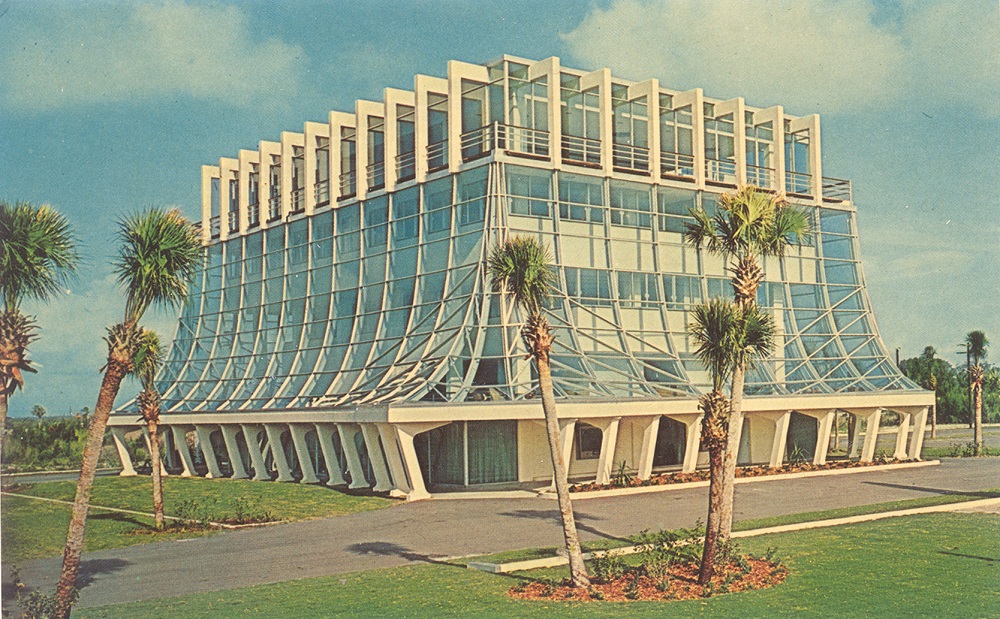
THE FIRST DECADE
Perhaps no community’s relationship with the space program resonates deeper than that of Cocoa Beach, Florida. Conveniently located just south of Cape Canaveral, it was home to many of the engineers and technicians who enabled humanity to explore the lunar surface. The First Federal Savings & Loan Association of Cocoa – Cocoa Beach Branch building was an outstanding representation of the region’s architectural link to the Space-Age and to the optimism of the early 1960s. Known to residents as the “Glass Bank,” the First Federal Savings & Loan Association building was designed by noted Sarasota School Architect Reginald C. Knight. Opening in 1962, this Mid-Century Modern structure of glass, steel, and concrete stood out on the barrier island community of Cocoa Beach both because of its height and because of its elegant Space-Age design.
With a construction cost exceeding $750,000 ($6.1 million in today’s dollars), the Glass Bank would have been an impressive structure for a larger city like Ft. Lauderdale, but in a community, the 1960 US Census revealed had yet to surpass 3,500 it demonstrated how business believed Cocoa Beach would continue to grow and thrive with each step to the Moon. The bank’s 4.5 floors of 20,000 sq ft offered mixed-use commercial space – the savings and loan on the ground floor, a mezzanine, 2 floors of office space, and a restaurant on the top floor. While the Sky Room Restaurant would only survive one year, it was supplanted by Ramon’s Rainbow Room. The Rainbow Room offered fine dining and expansive views of the Atlantic Ocean, along with performances by many of the era’s Las Vegas headliners. To accommodate a need for additional seating, in 1965, the Rainbow Room initiated a significant modification to the building by extending the restaurant’s walls to the edge of the white arches that had provided patrons an opportunity to watch Cape launches from an observation skywalk that encircled the fourth floor. Citizens made the mezzanine level a community focal point, where groups ranging from scouting to weight loss met free of charge. Because of its height and distinctive design, the building became a physical navigation point for the community – directions were given in terms of being north or south of the Glass Bank. During the first decade of operation, it was not uncommon for tourists to photograph the Glass Bank and request a tour.
A BUILDING EVOLVES
The significant reduction of NASA’s budget following the successful completion of Project Apollo’s initial lunar landing in 1969 would impact businesses throughout Brevard County, including Cocoa Beach. Vacancies began to appear on the Glass Bank’s second and third-floor offices, which had maintained full occupancy during the building’s first decade of operation. Ramon’s Rainbow Room would close in 1970, and it was replaced by Marby’s Rainbow Room which would close in 1972 and end restaurant operations in the Glass Bank. Eventually, tourism and retirees replaced the missile and space industry, and with it changed the commercial space needs of the city. This was reflected in the structure’s major modifications in the 1980s, as the fourth-floor upscale restaurant space gave way to a law firm, and aerospace office space was ultimately transformed into a fitness center. In an attempt to remedy some of its glass facade leakage issues, the exterior of the structure sported significantly less glass than it did in the 1960s, and attorney Frank Wolfe would top the structure with a two-story penthouse condominium. In 2004, hurricanes significantly damaged the building resulting in the loss of all commercial occupants and bring a decade of structural decay. In spite of this, its demolition in 2015 would demonstrate the former significance of the Glass Bank to the community as crowds gathered to view its destruction and share stories of its glory years.
1961 – Structure Construction ends.
1962 – First Federal Savings & Loan Association of Cocoa – Cocoa Beach Branch officially opens.
1962 – Sky Room Restaurant opens.
1963 – Sky Room Restaurant closes.
1963 – Construction begins on the external “Express Elevator”.
1963 – Ramon’s Rainbow Room opens.
1965 – Rainbow Room expands floor space by moving windows to the edge of the external catwalk.
1970 – Ramon’s Rainbow Room closes.
1970 – Marby’s Rainbow Room opens.
1972 – Marby’s Rainbow room closes. No other restaurant will occupy the 4th floor.
1979 – Tornado damages Glass Bank.
1983 – Penthouse addition and stucco of exterior facade completed.
1983 – First Federal Savings & Loan Association is acquired by The First FA.
1985/86 – Reliance Bank occupies first-floor banking facilities.
1990 – Nautilus Fitness modifications.
1995 – Name change of lower floor banking facilities to Huntington Bank.
2004 – No tenants occupy the lower portion of the building.
2014 – City approves demolition.
2014 – Preparation for demolition.
2015 – Demolition of the building.

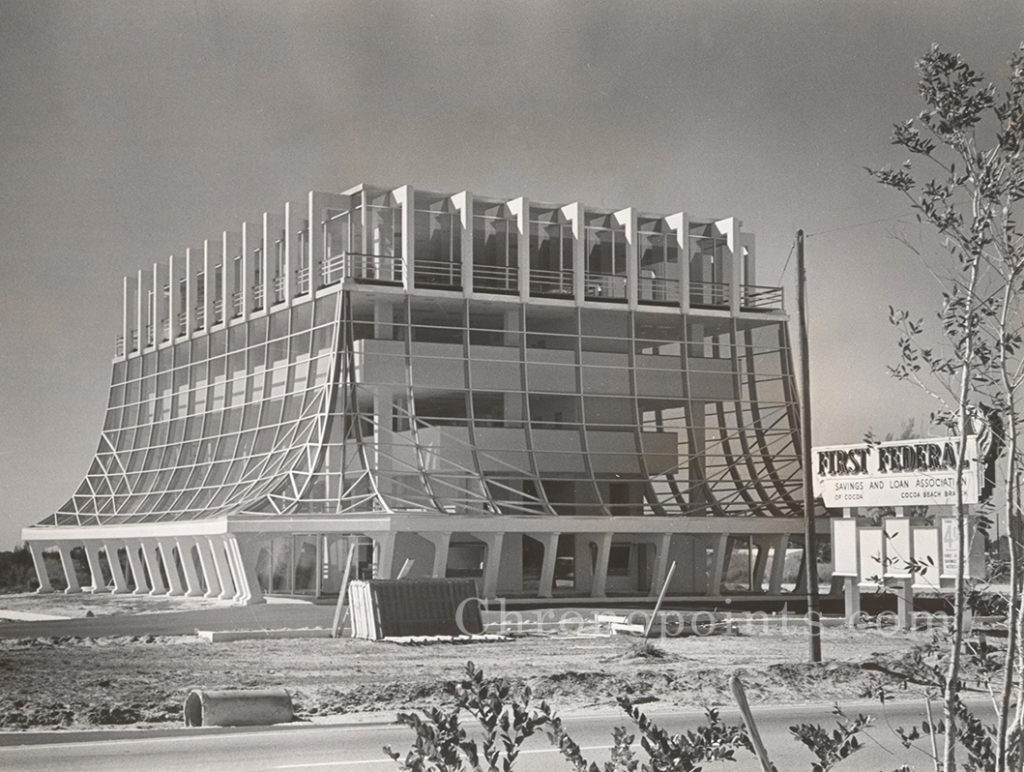
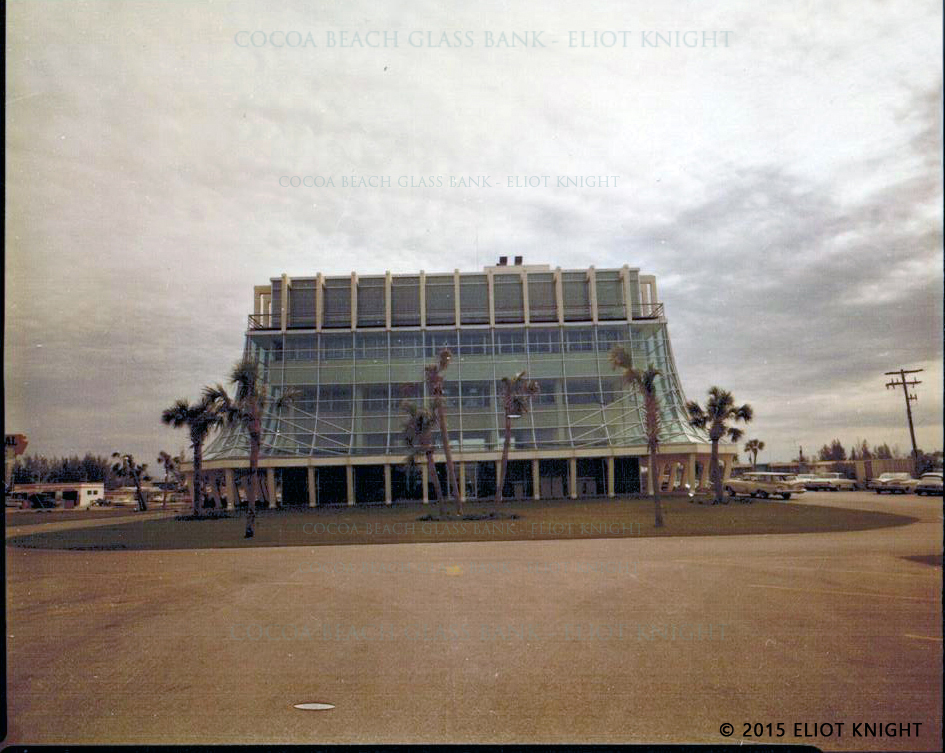
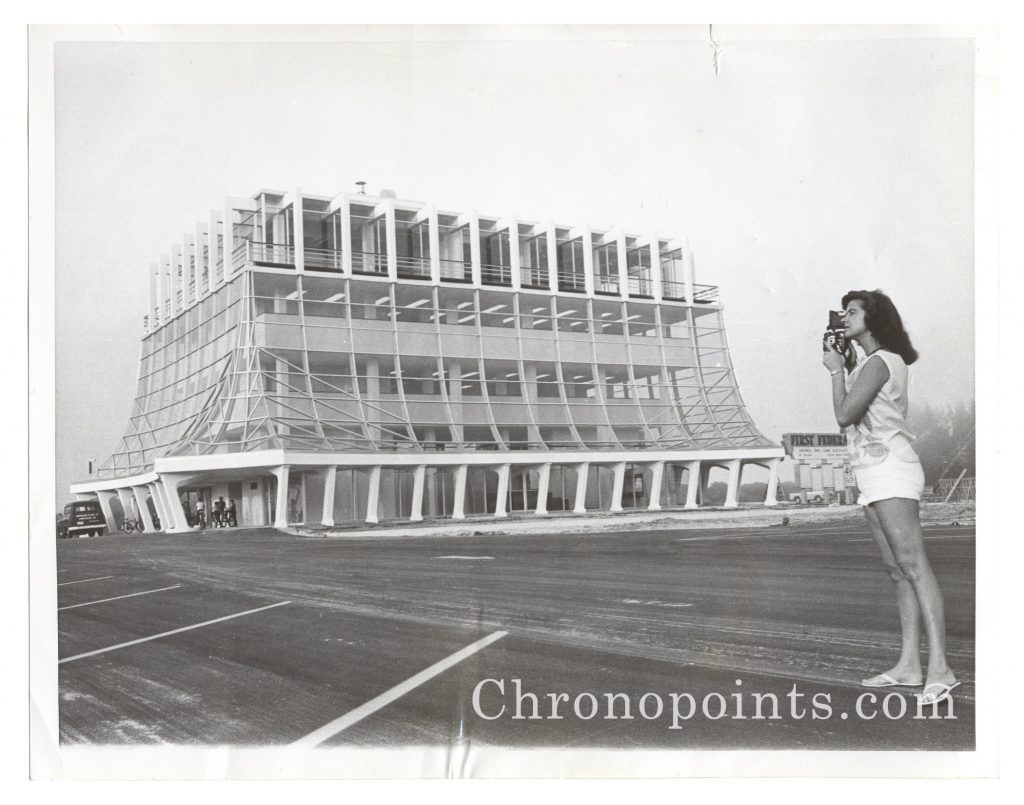
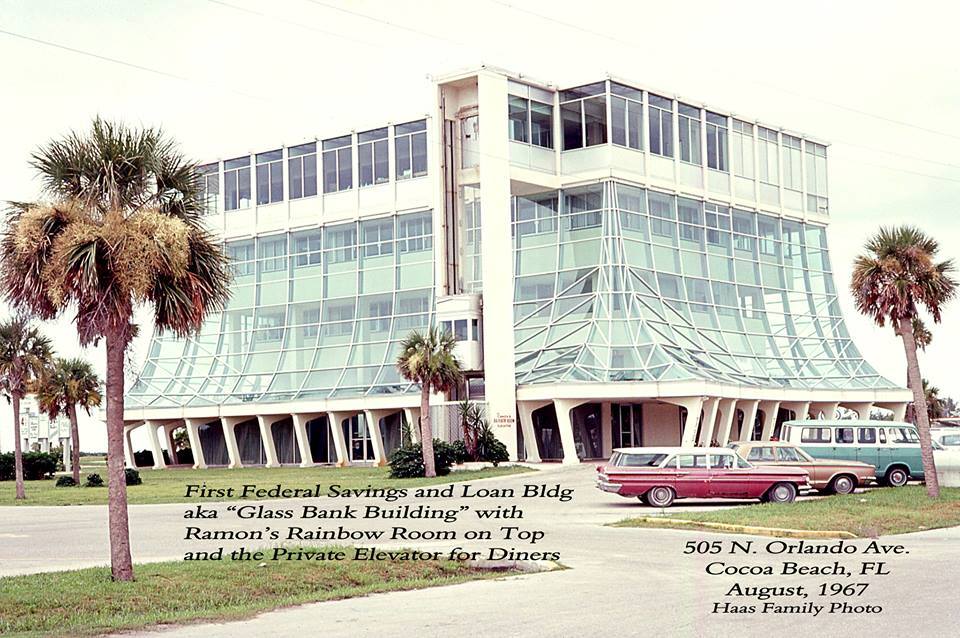
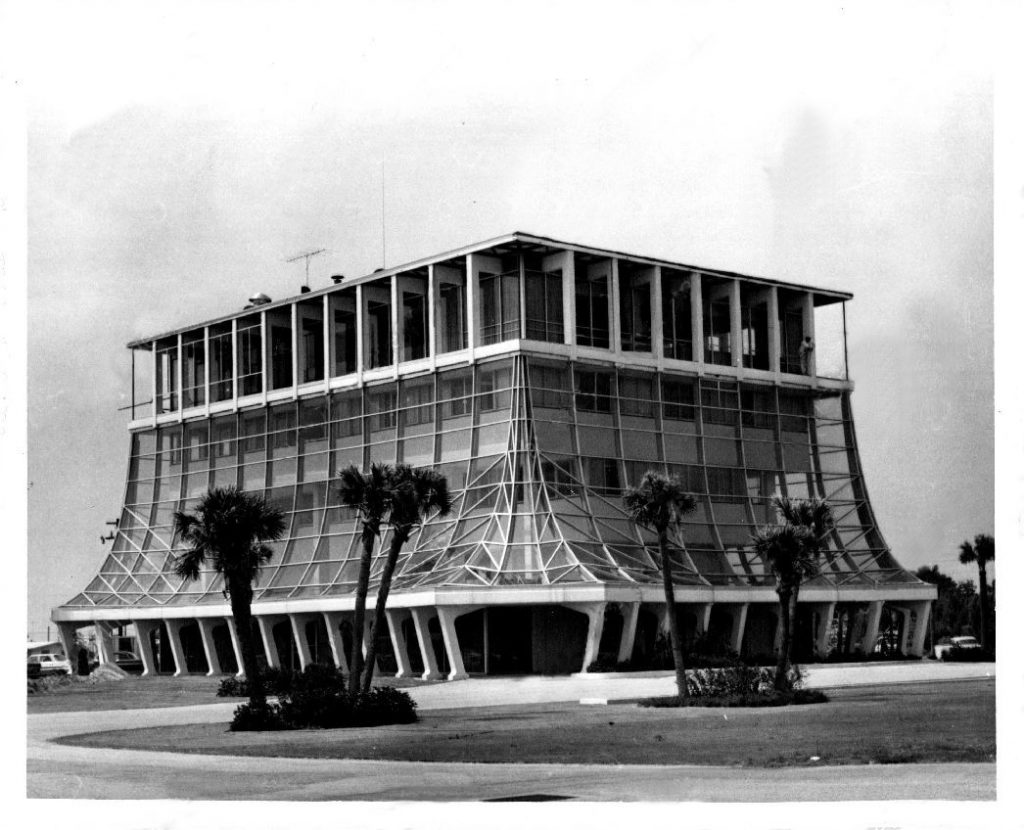
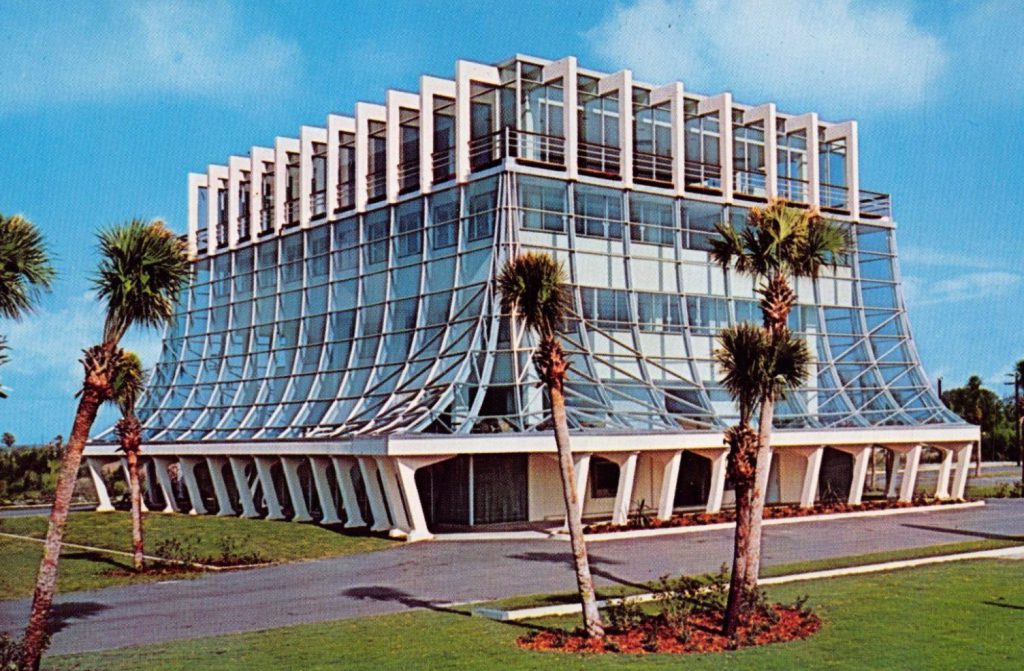
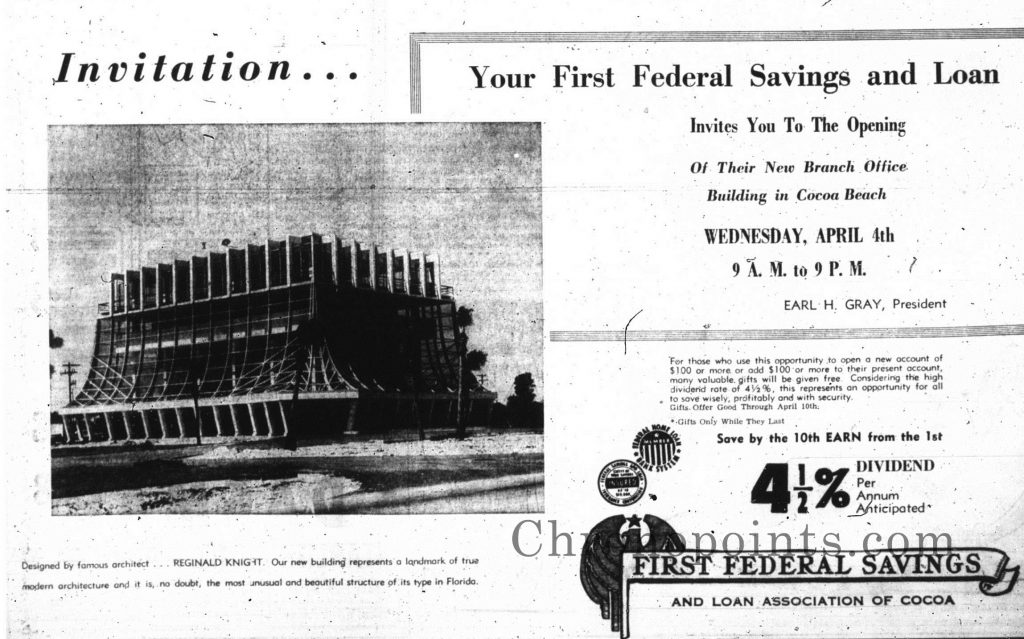
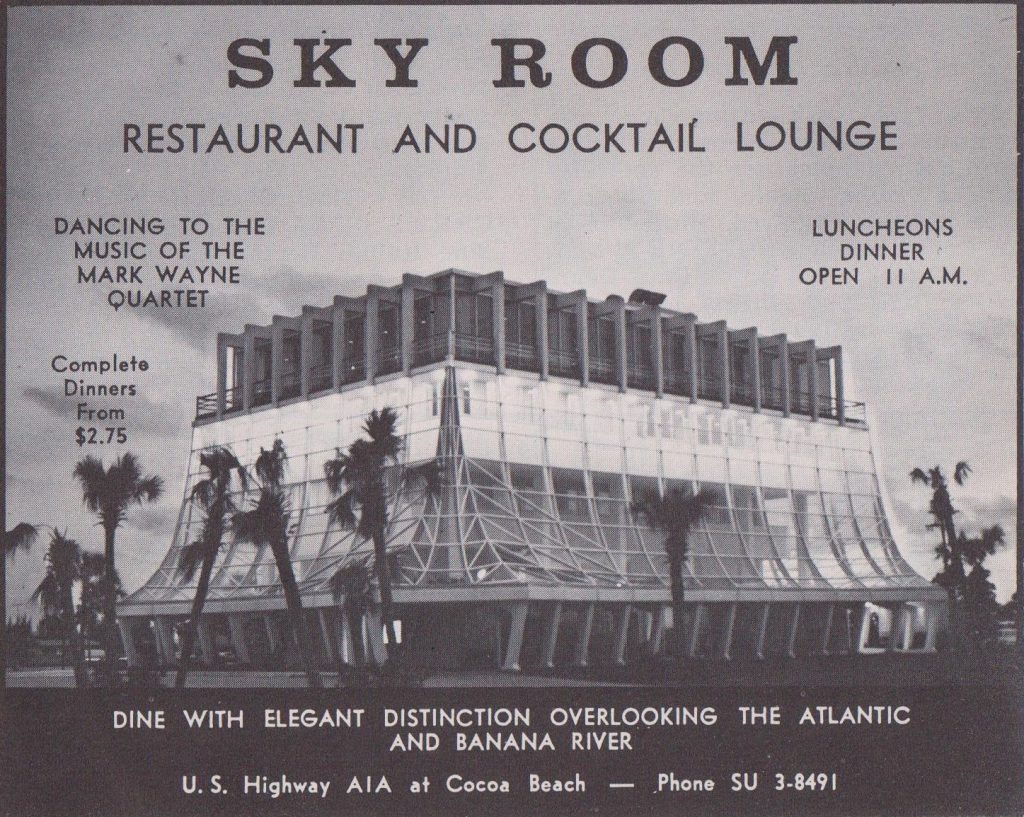
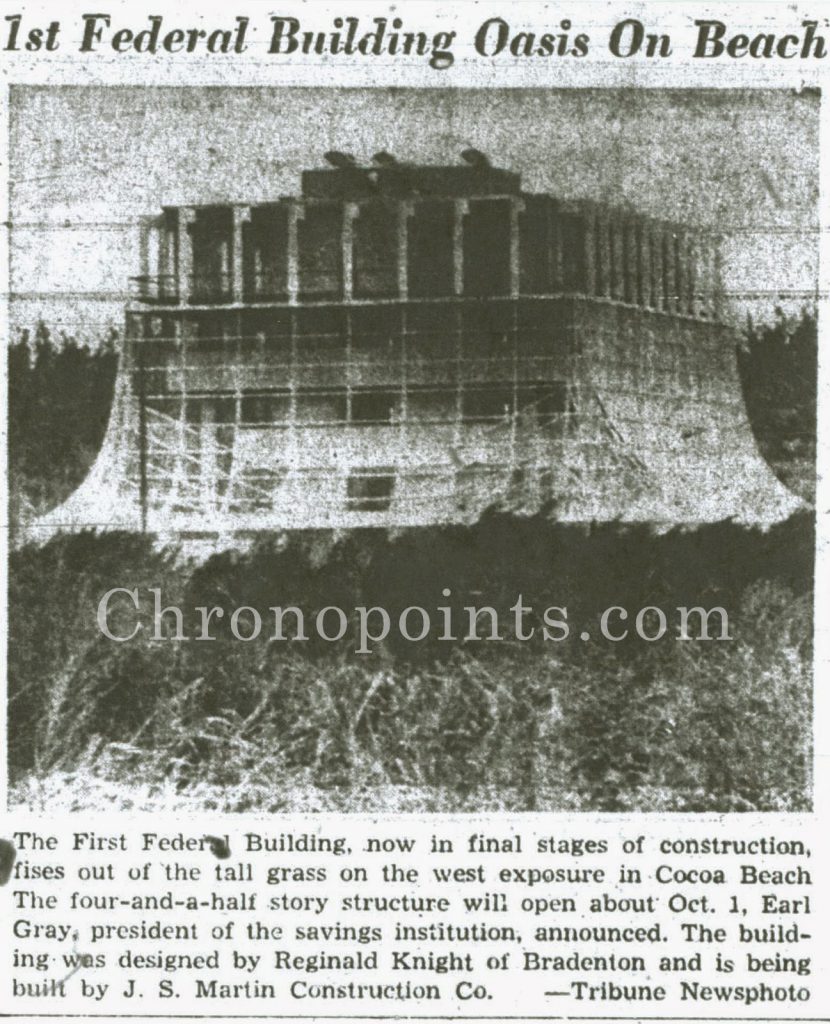
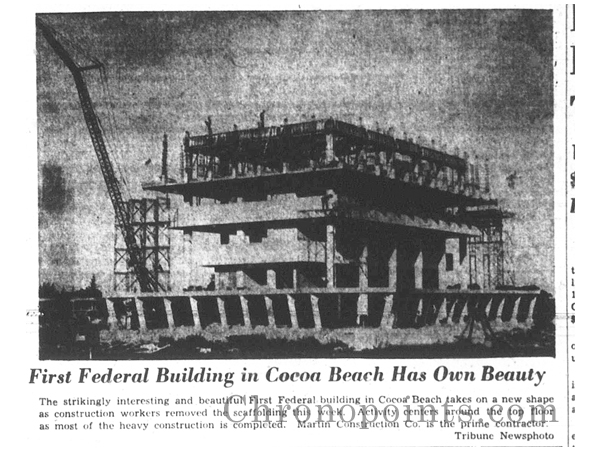
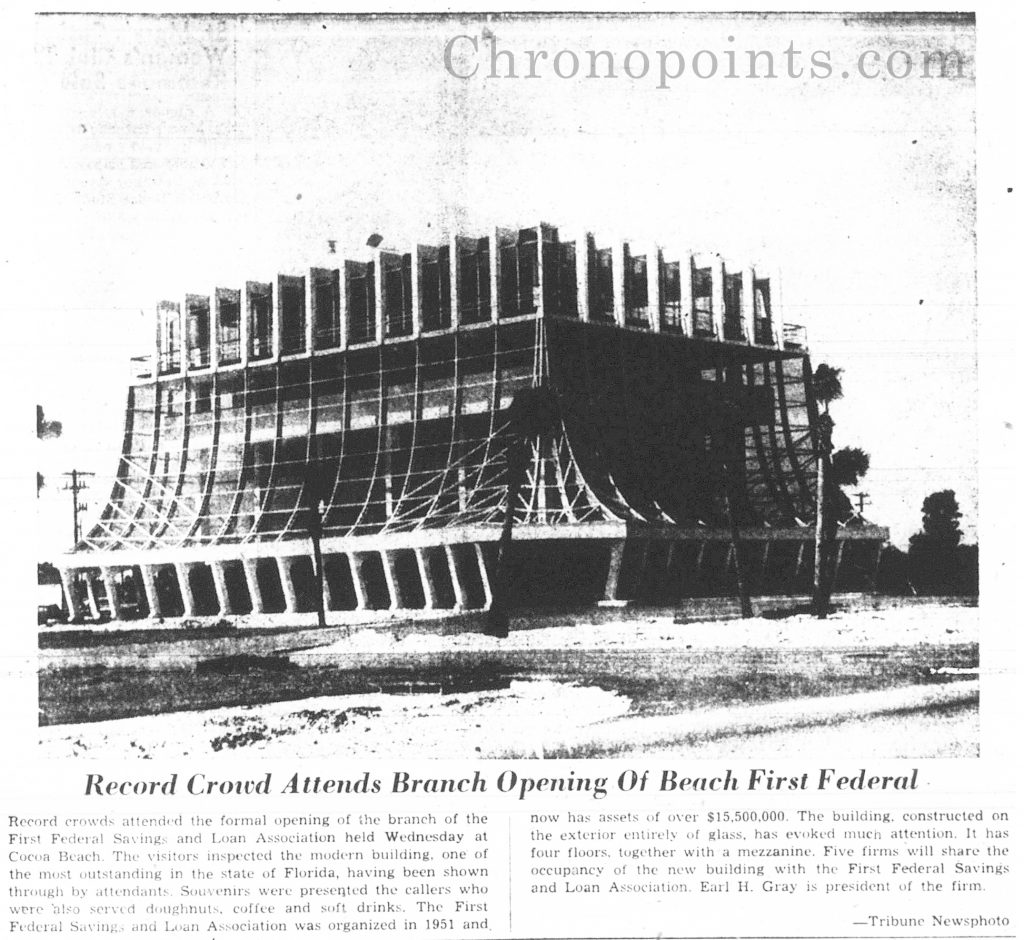
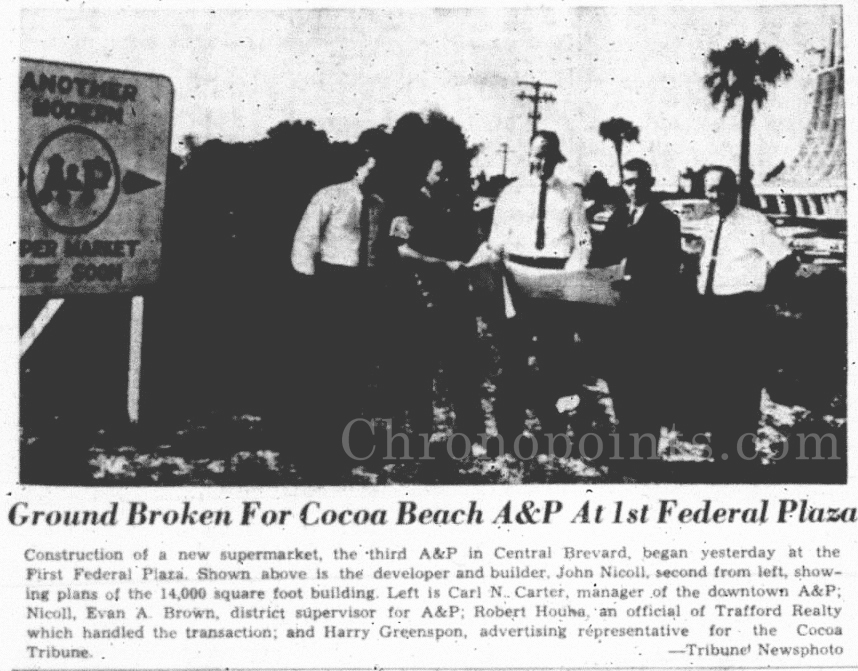
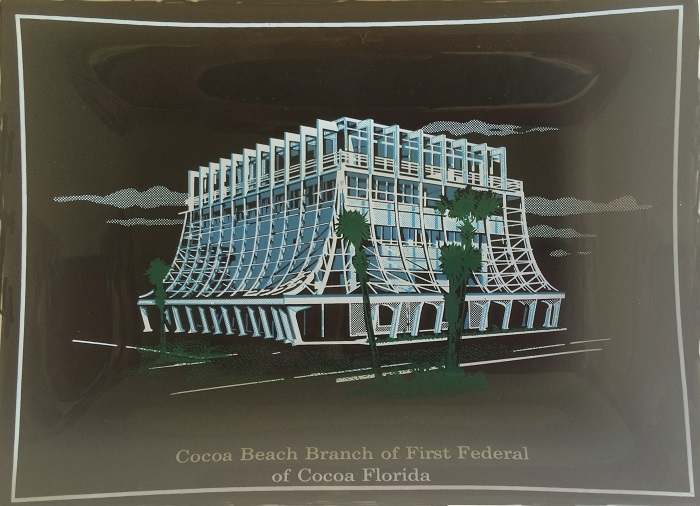
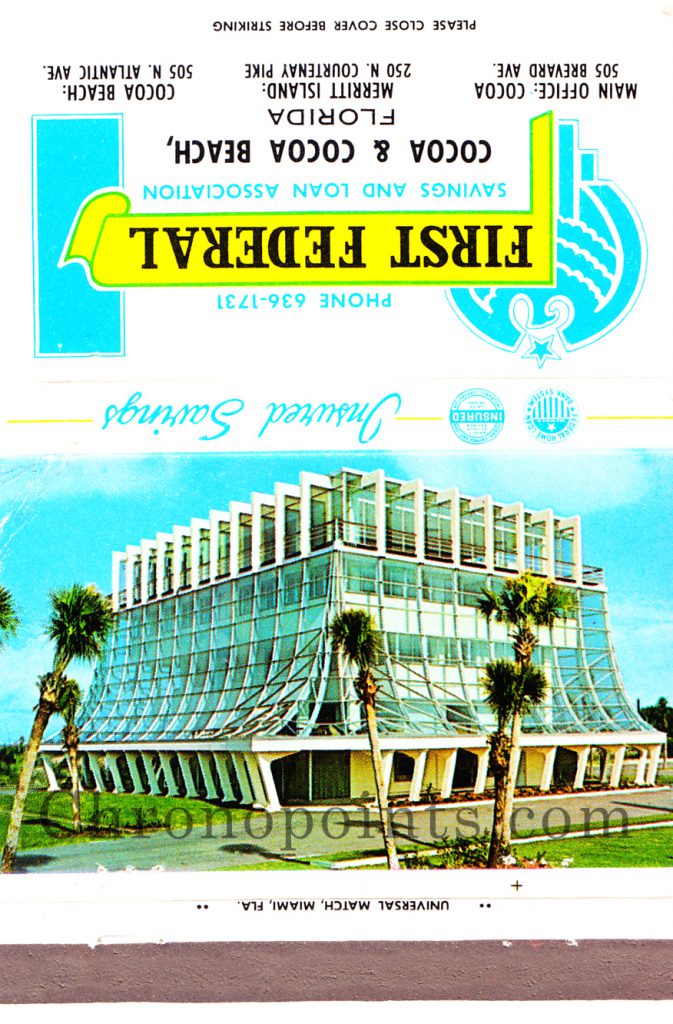
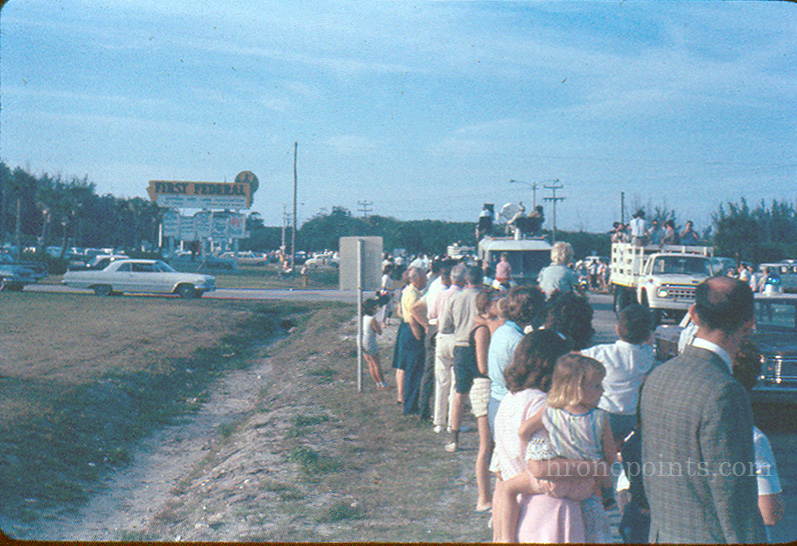

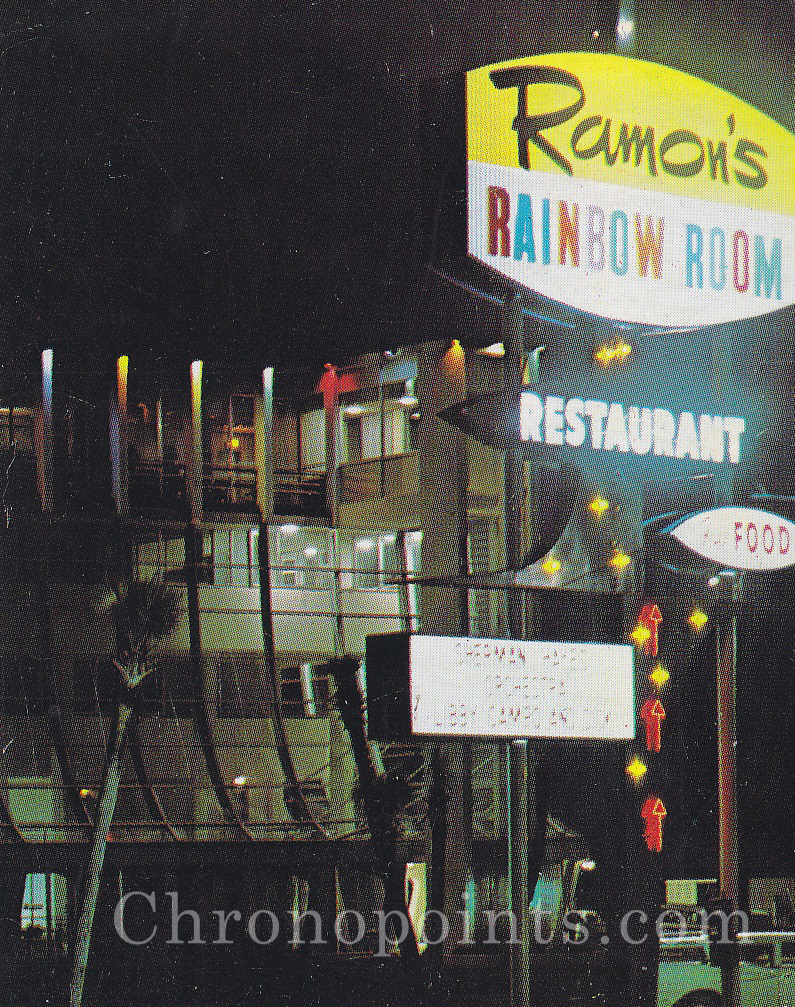
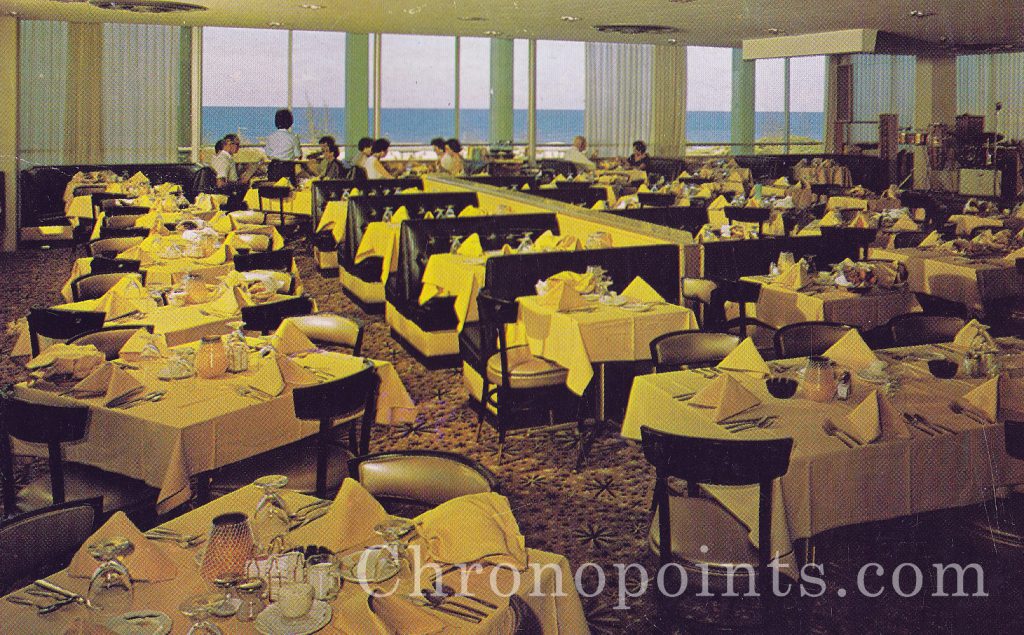
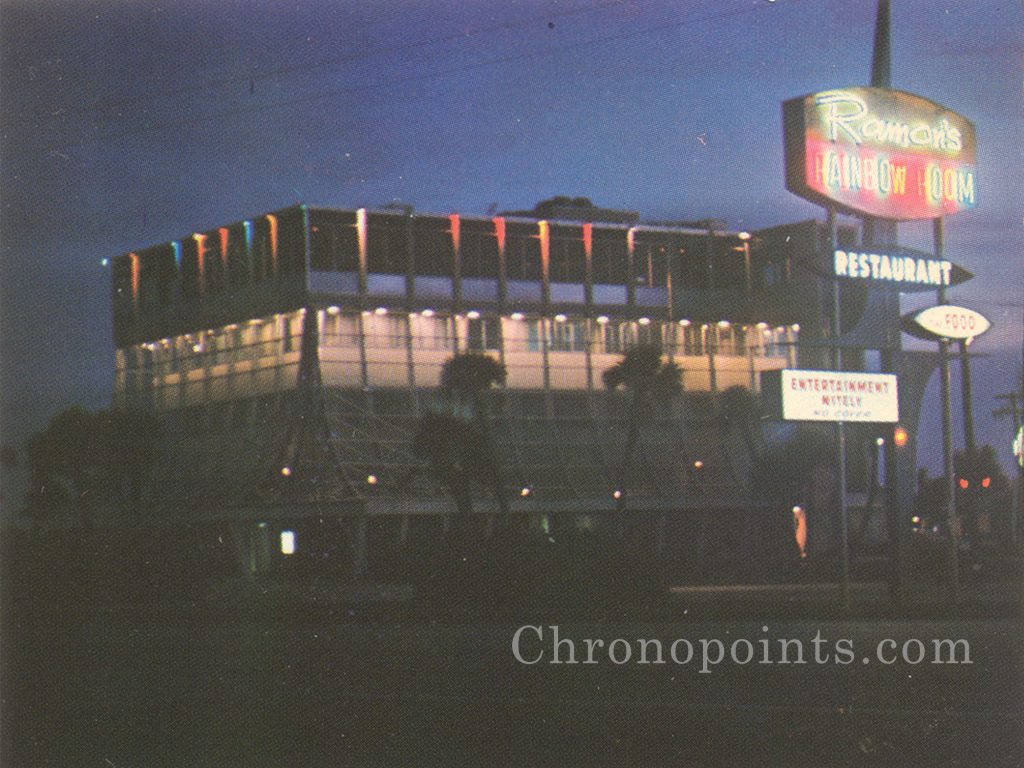
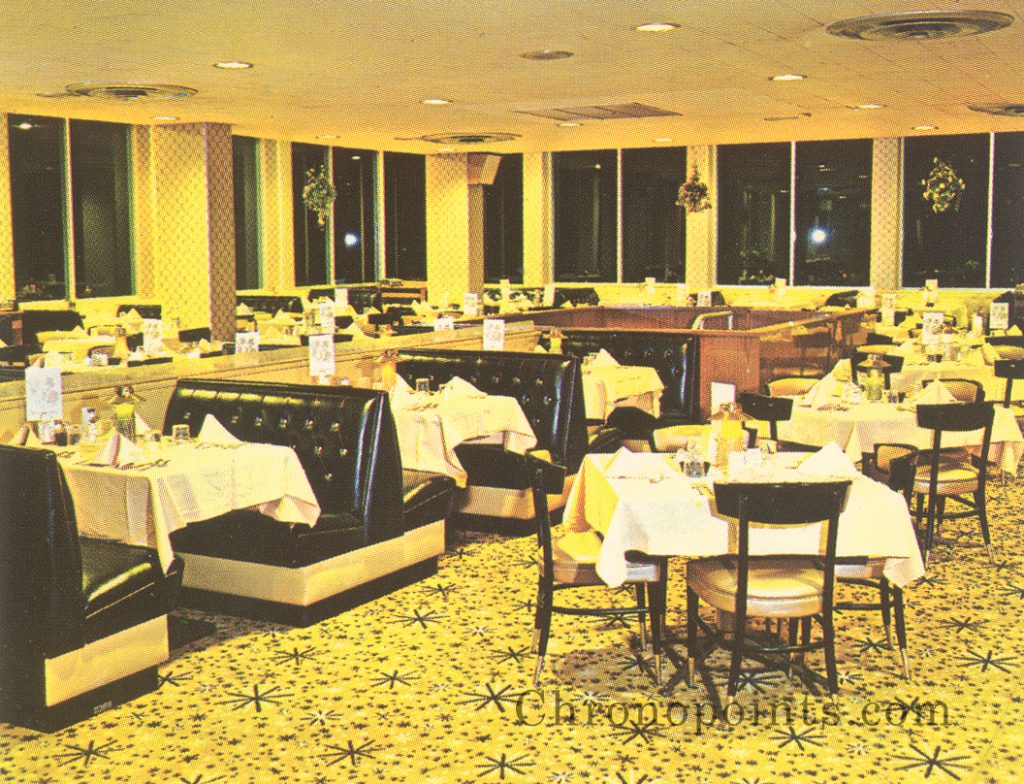
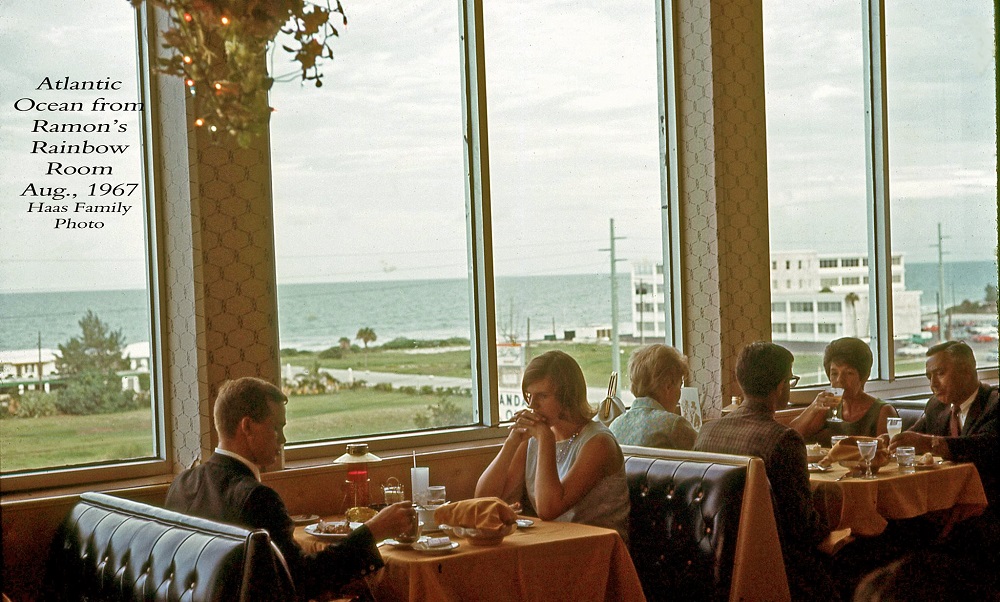
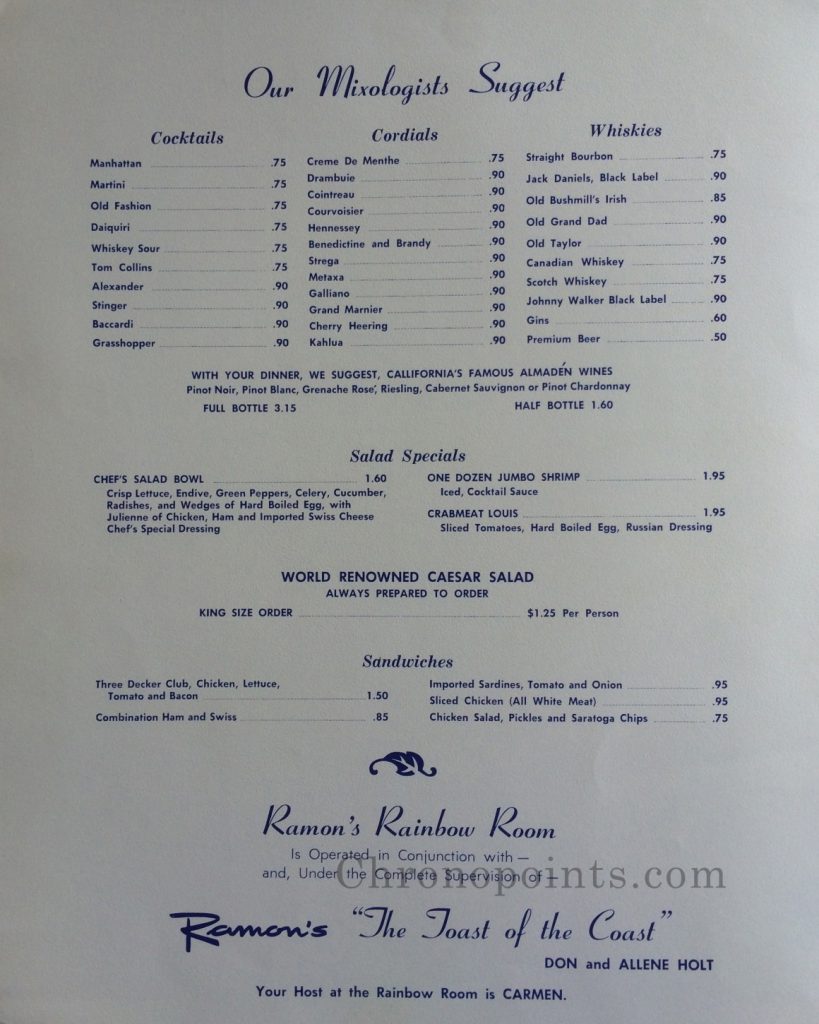
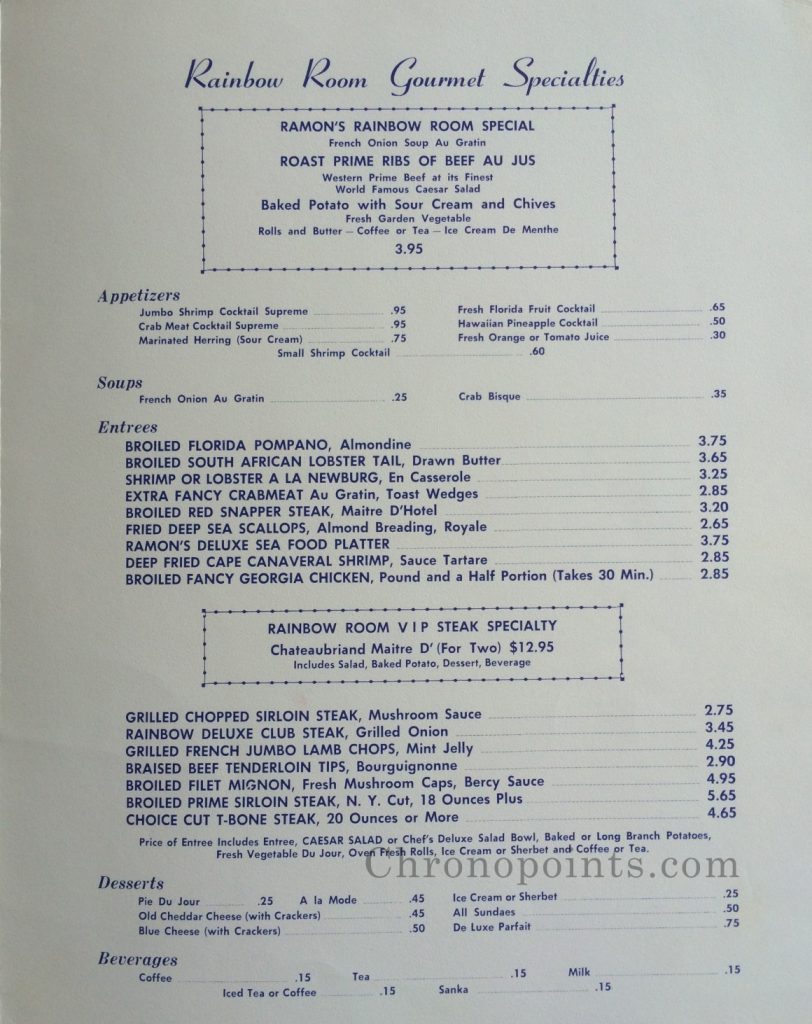
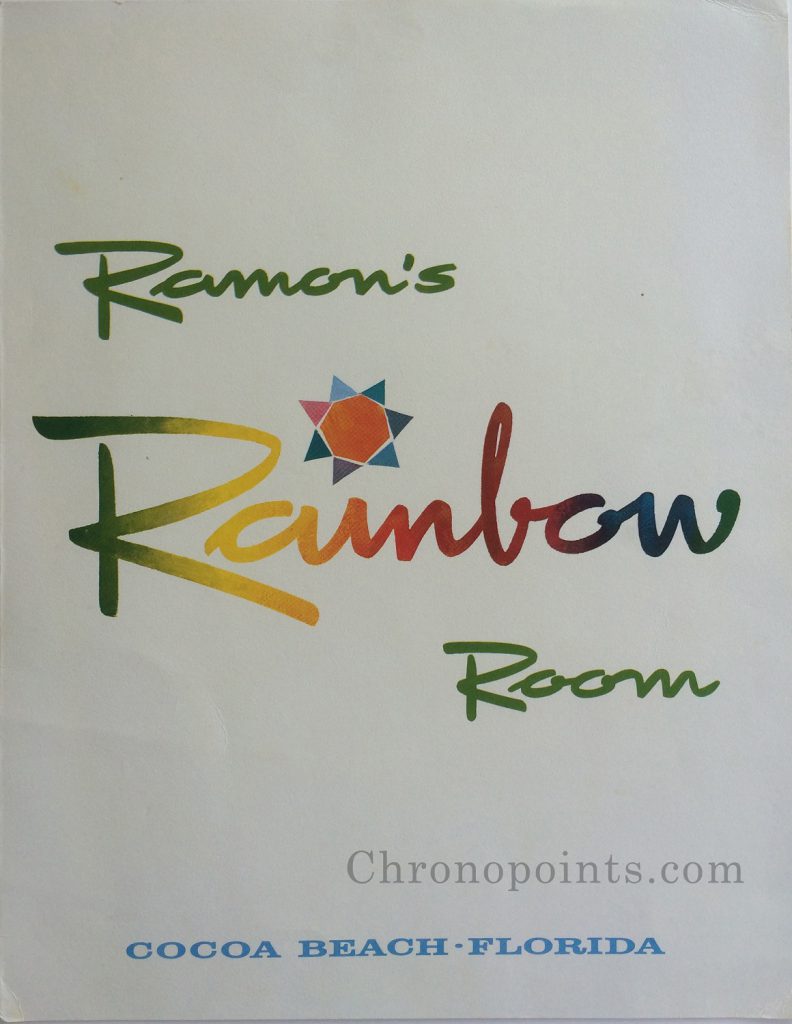
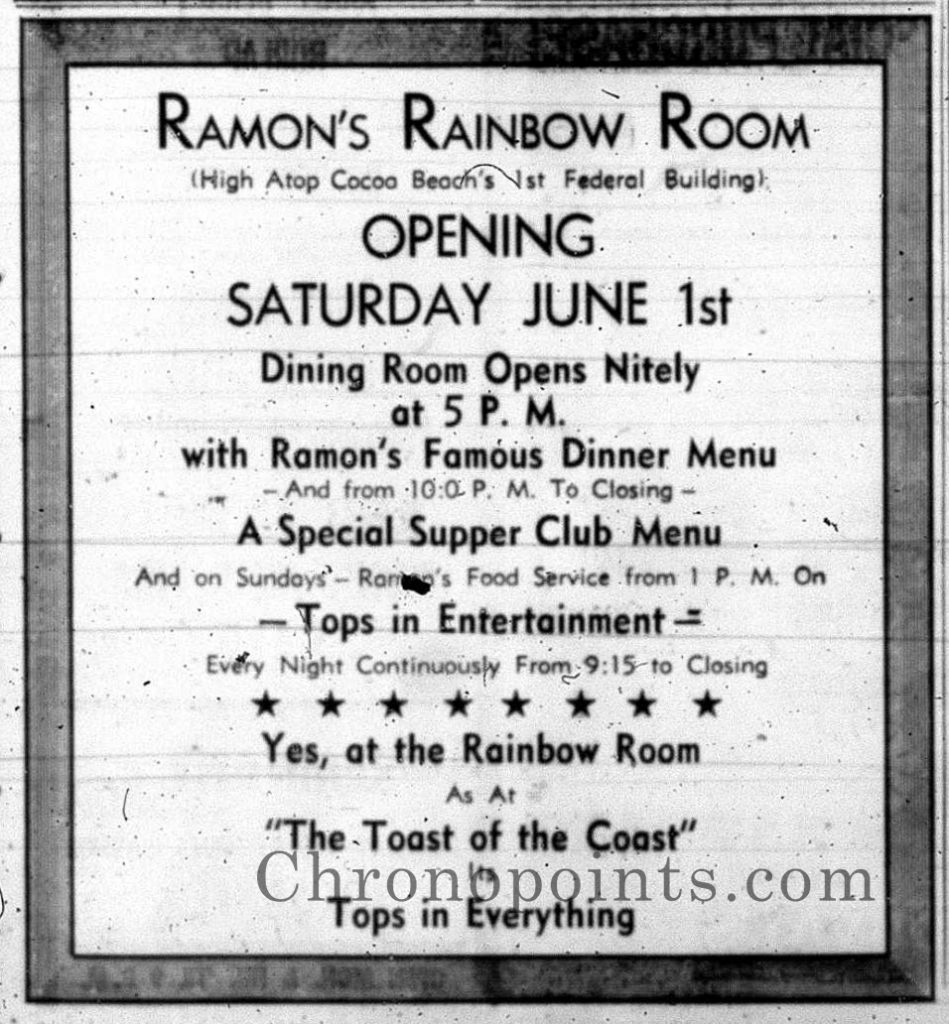
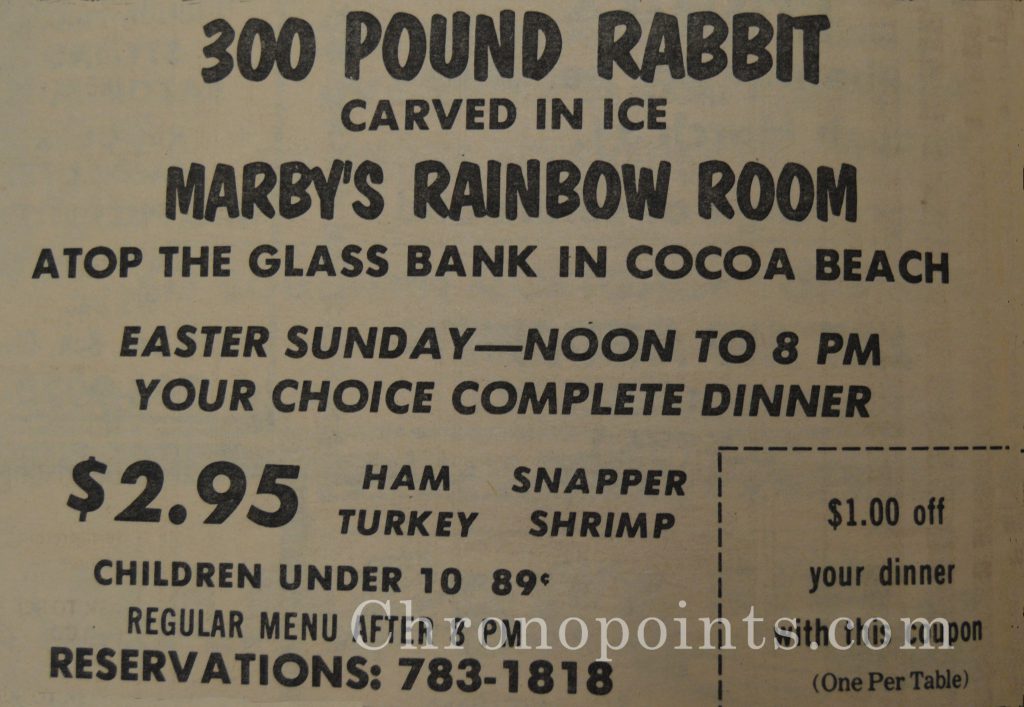
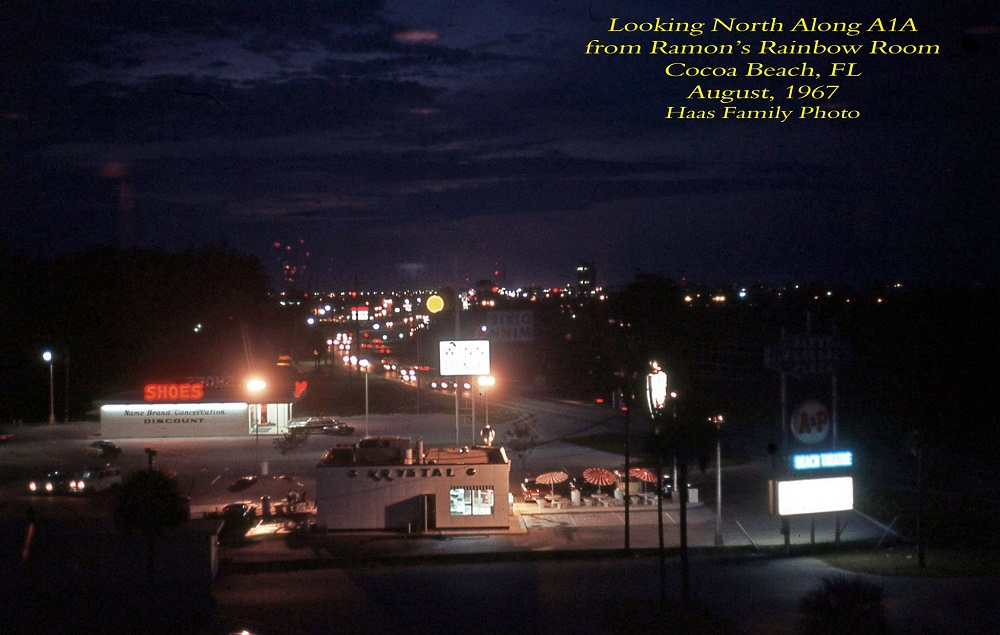
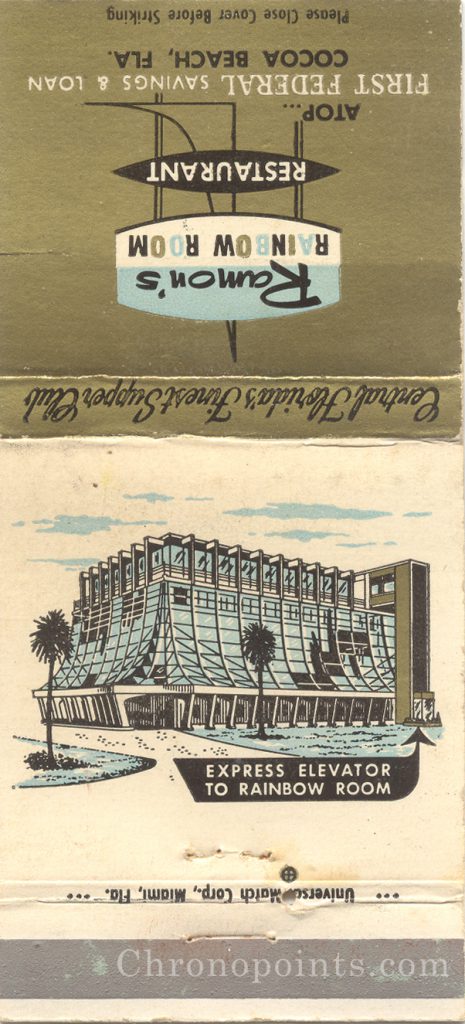
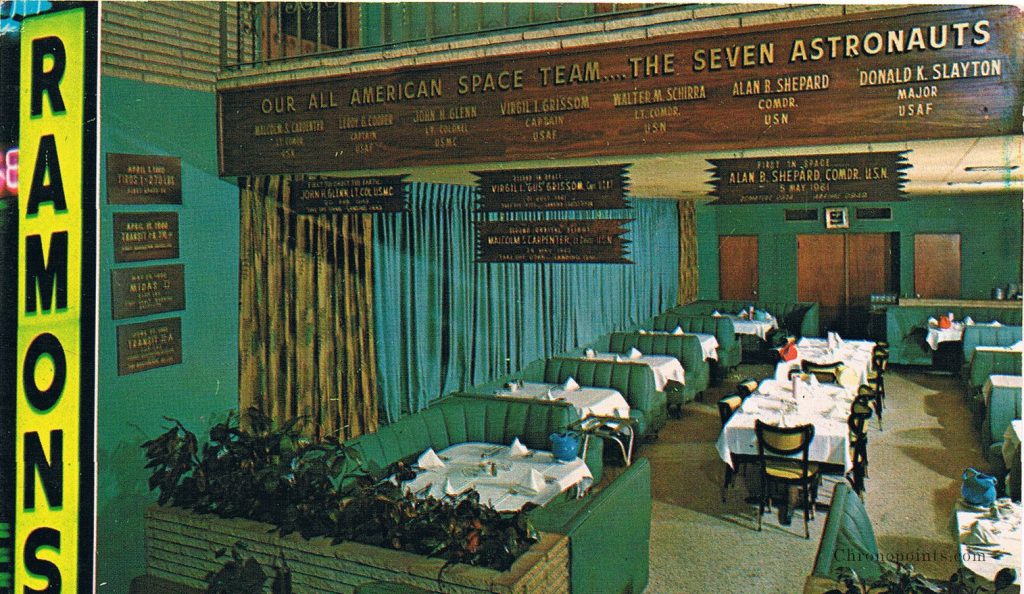
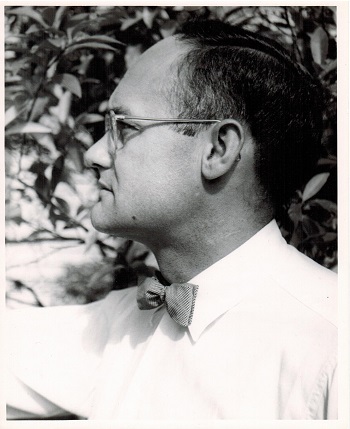

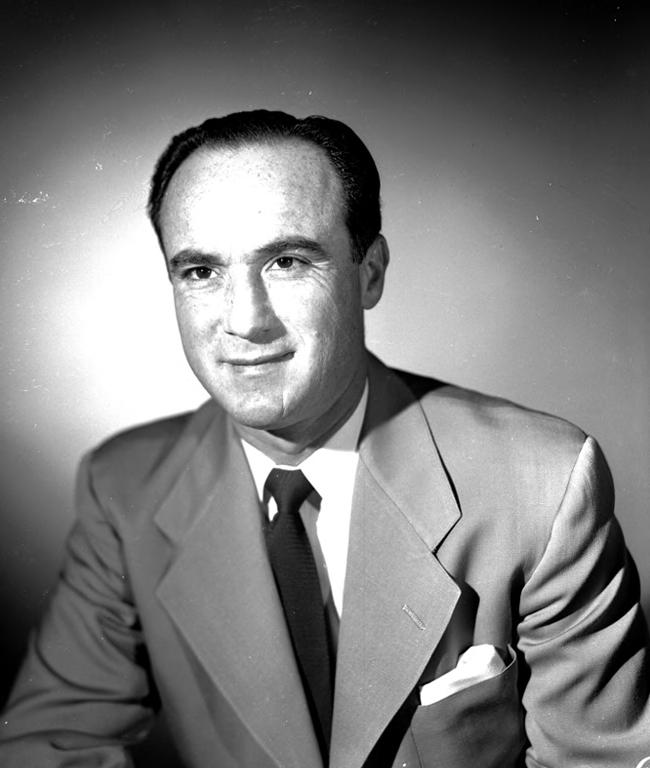

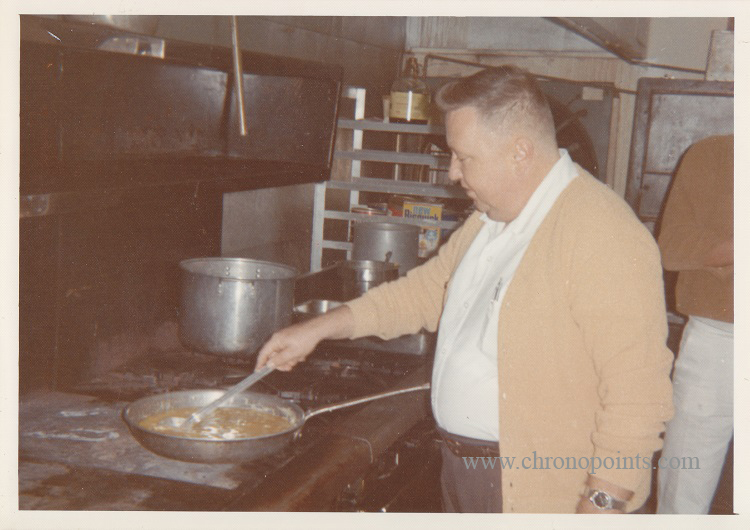

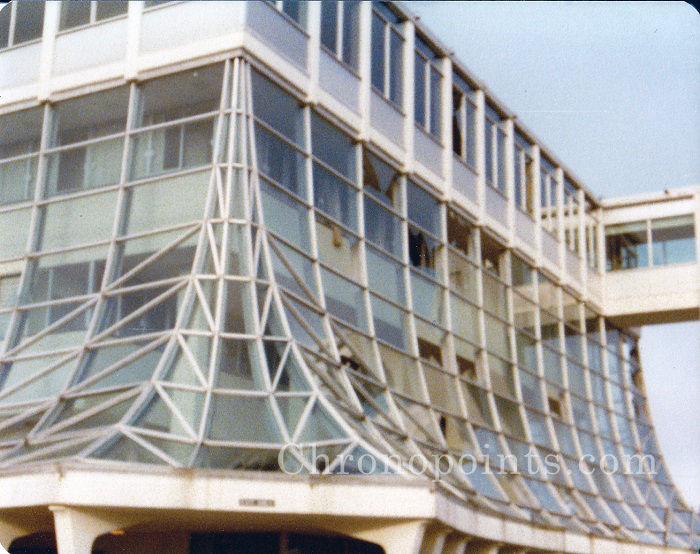
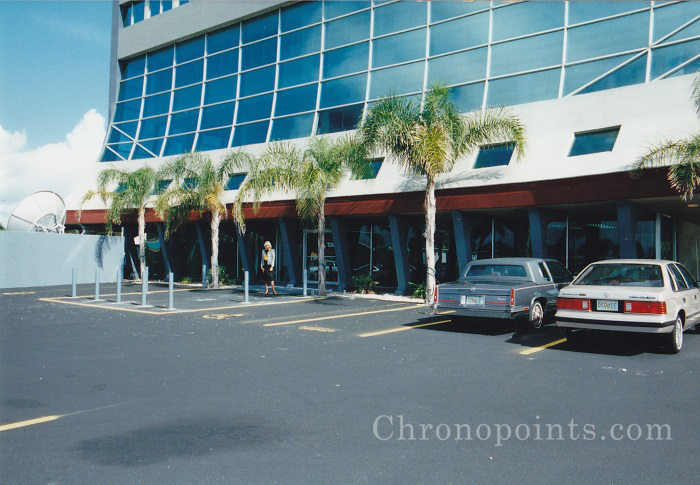
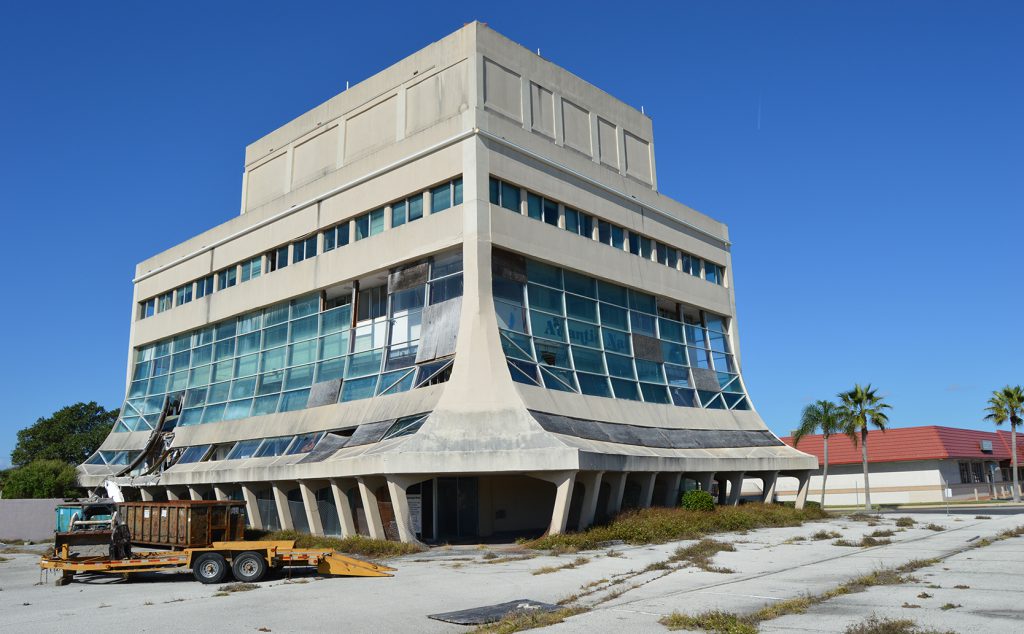
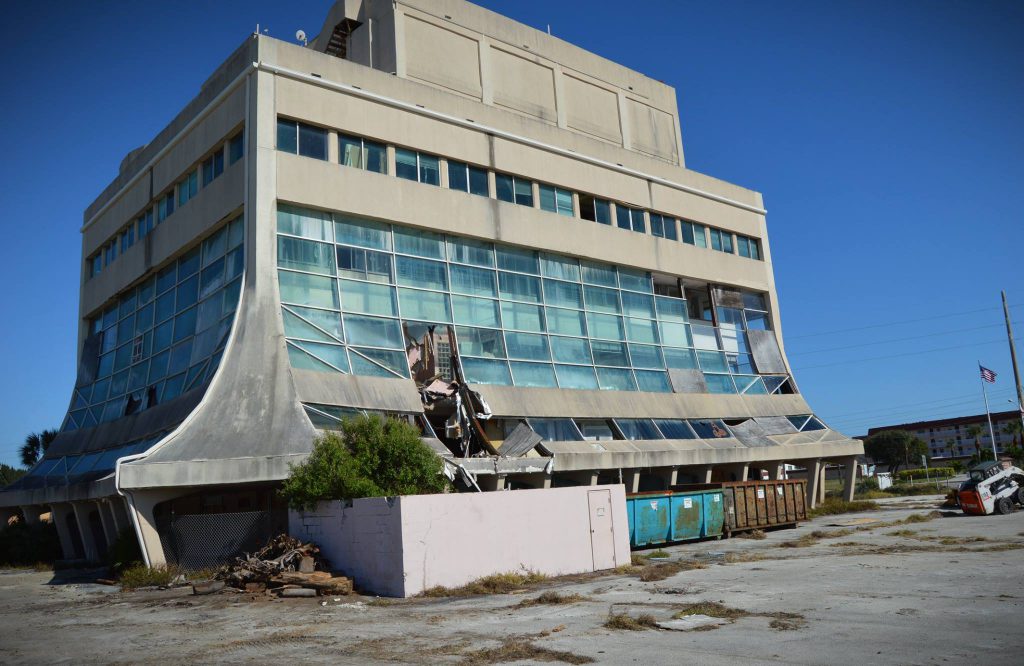
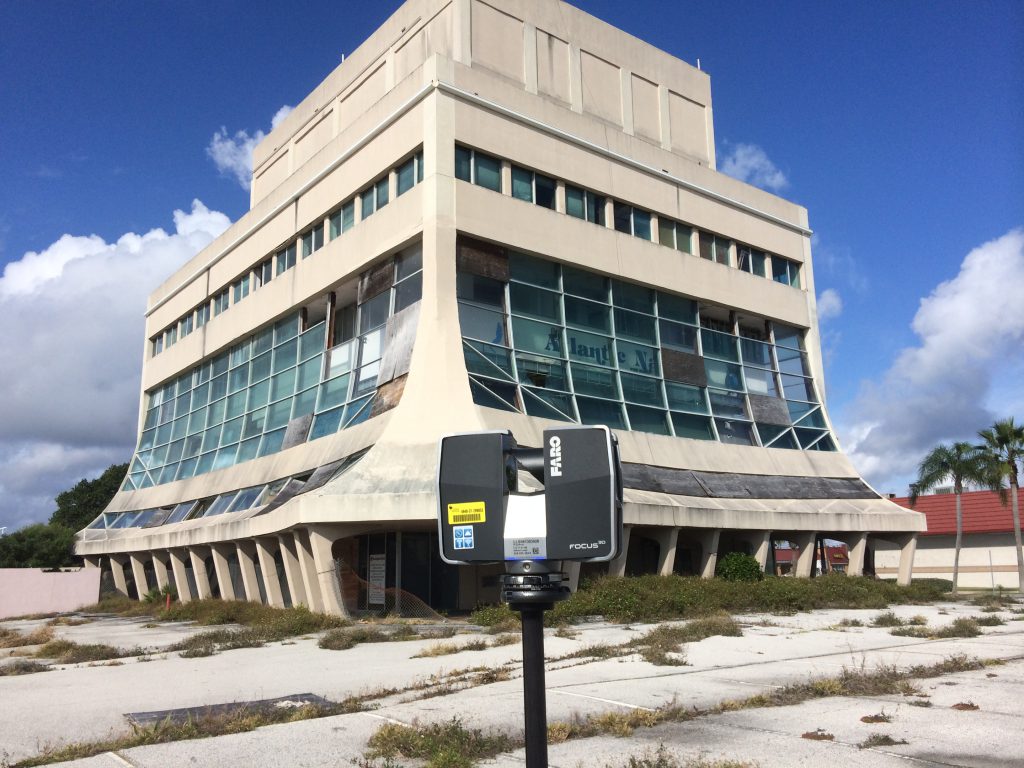
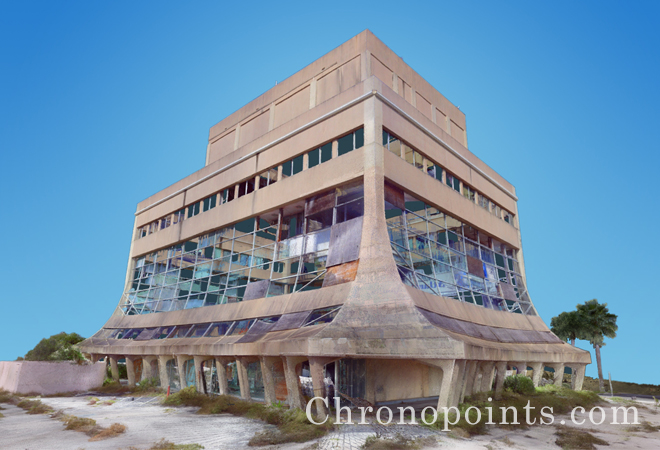
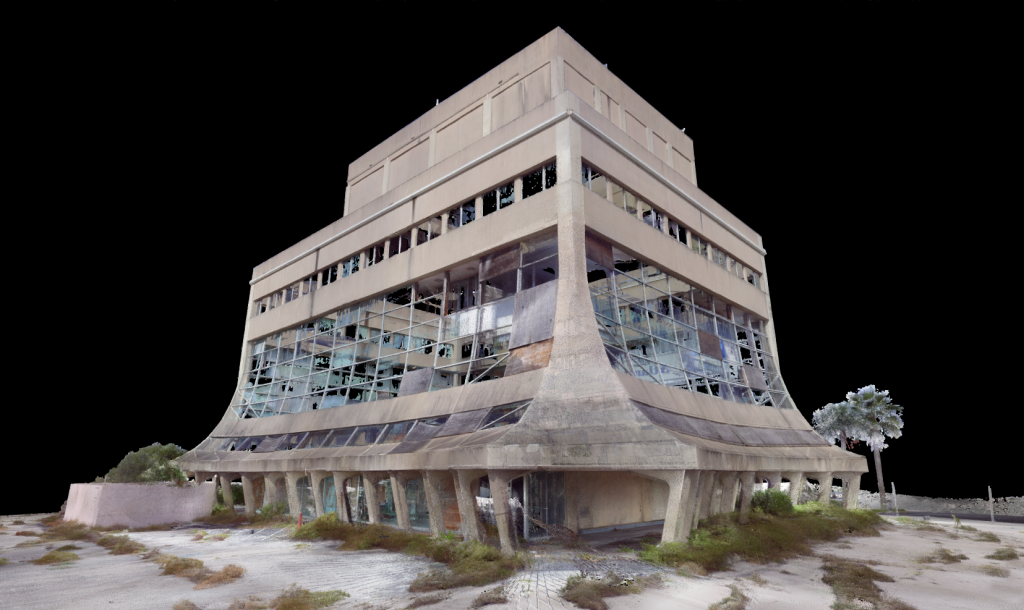
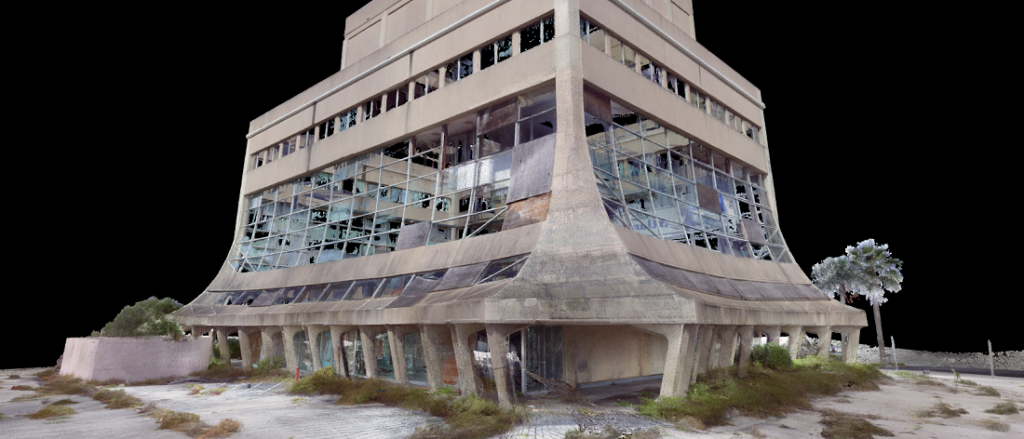










Laser Scanning
In November 2014, Chronopoints researchers from the Institute for Simulation and Training at the University of Central Florida conducted a laser scan of the “Glass Bank” in the City of Cocoa Beach. Constructed to be the home of the Cocoa Beach branch of the First Federal Savings & Loan Association of Cocoa, the structure clearly was a Space-Age calling card to the missile activities at Cape Canaveral/Kennedy just north of the city. The video provides images of the building during its heyday in the 1960s – including Ramon’s Rainbow Room.
The highly accurate laser scan point cloud data acquired provides a digital representation of the building as it existed immediately before demolition and served as a foundation to assist in developing a 3D model of the structure’s exterior as it appeared in 1963. Historic images, documents, and oral histories enabled our team to model the interior of the First Federal Saving & Loan lobby, Ramon’s Rainbow Room dining area, and the Express View elevator.
Virtual Exploration
Here, you can see a cutaway of the full interior of the Glass Bank 3D model. Below are several videos of the building in the Unreal engine. Each provides a unique perspective on the structure.
ChronoPoints placed the model of the Glass Bank into the Unreal game engine. This will enable users to explore the building and interact with artifacts on a traditional flat computer monitor.
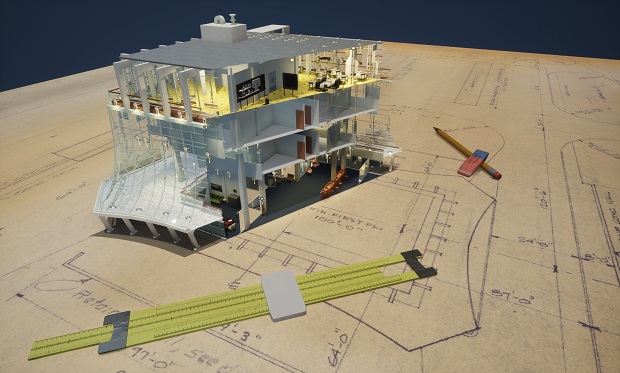
This is a wonderful “Droste Effect” video of the Glass Bank circa 1963. It provides a view from the northeast office and it moves out toward the building’s exterior.
The ground floor of the Glass Bank was occupied by the First Federal Savings & Loan of Cocoa—Cocoa Beach Branch. You can visit the ground floor and mezzanine levels virtually as they would have appeared in 1963.
While first known as the Sky Room, the restaurant atop the Glass Bank would become Ramon’s Rainbow Room. It was associated with the famous Ramon’s Restaurant on St. Rd. 520 near A1A. If you were fortunate enough to dine at either location, you probably wish you could have their Caesar salad dressing on your salad this evening.
This video represents our initial virtual recreation of the Cocoa Beach Glass Bank as it appeared in 1963 – the exterior of the building and a basic ground floor. Additional images and oral history reflections permitted us to provide the more accurate model seen in the videos above.
Digital Media students at the University of Central Florida produced this historical timeline of the Cocoa Beach Glass Bank. Thank you to all who contributed images for the timeline – if you have photographs of the building before 1980, please contact us.
A montage aerial video of the Glass Bank and its demolition was taken with a UAV.

